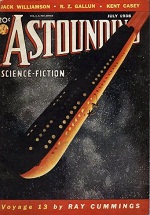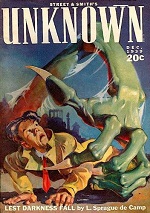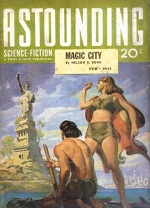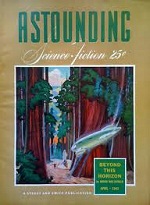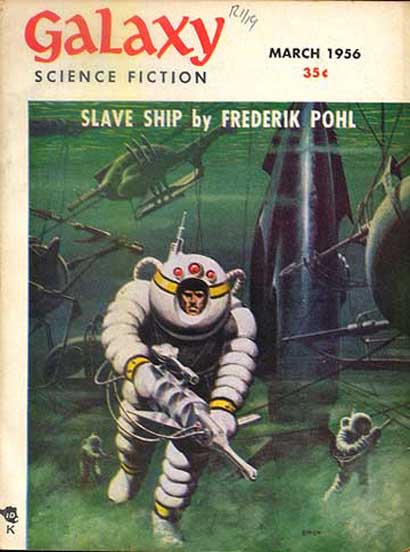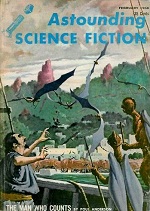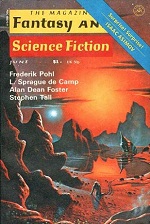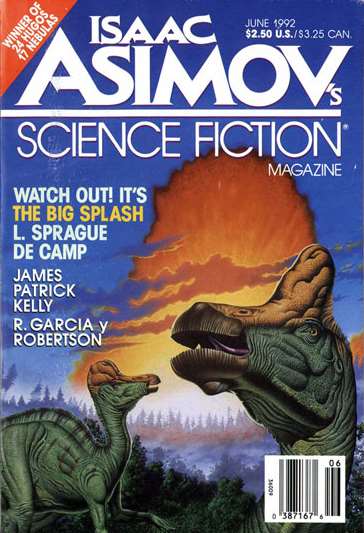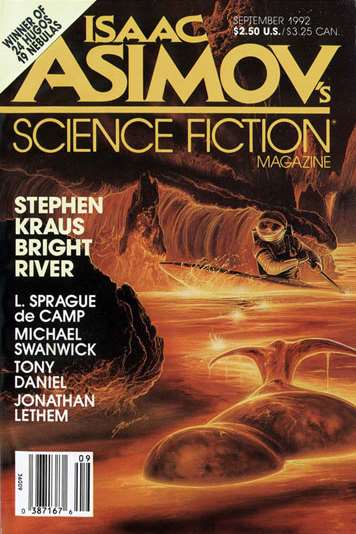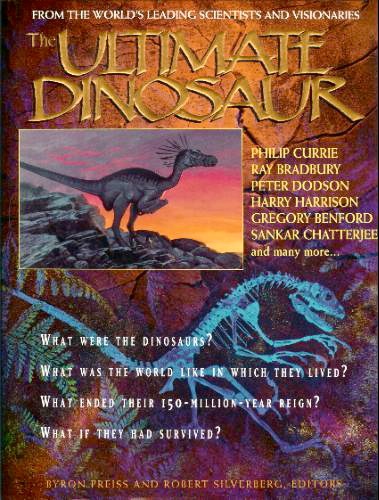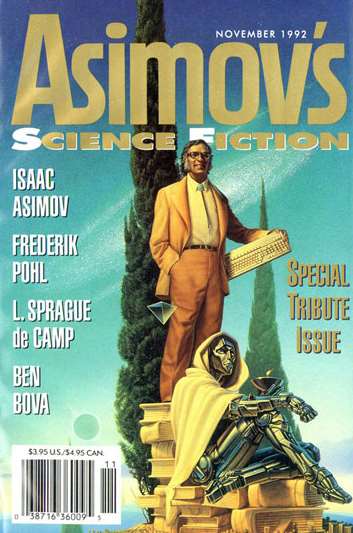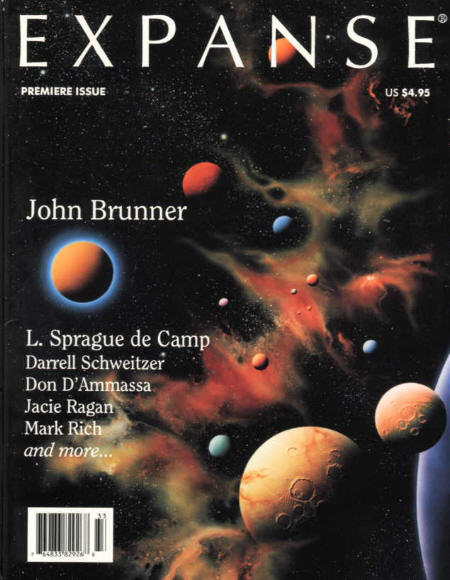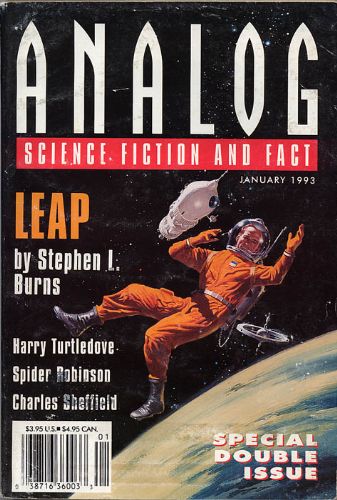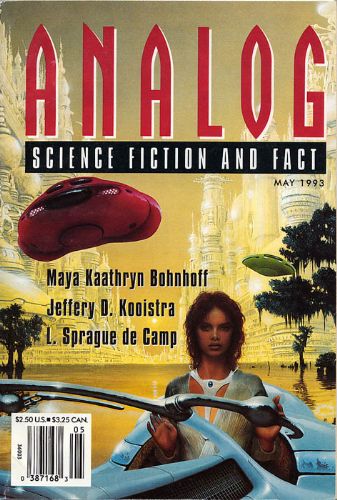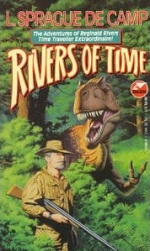Short Story
L. Sprague de Camp
writer
- Filter: Show all works, including those with no time phenomena.
- Found: 21 results in 2.84ms
Essay
Language for Time Travelers
- by L. Sprague de Camp
- Astounding Science Fiction, July 1938
This essay convinced me to add at least a few nonfiction works to my list. After all, why not? De Camp interleaves a few fictional vignettes with thoughts on how language might change over the next few centuries. For me, it shows how well the time travel paradigm had been established by 1939.
As a bonus, this essay appeared in the very issue of Astounding that has the final installment of The Legion of Time and which caused all the trouble in my story “Saving Astounding.”
As a bonus, this essay appeared in the very issue of Astounding that has the final installment of The Legion of Time and which caused all the trouble in my story “Saving Astounding.”
Wah lenksh? Inksh lenksh, coss. Wah you speak? Said, sah-y, daw geh-ih. Daw, neitha. You fresh? Jumm?

Short Story
Novel
Lest Darkness Fall
- by L. Sprague de Camp
- in Unknown, December 1939
During a thunderstorm, archaeologist Martin Padway is thrown back to Rome of 535 A.D., whereupon he sets out to stop the coming Dark Ages.
Padway feared a mob of religious enthusiasts more than anything on earth, no doubt because their mental processes were so utterly alien to his own.

Short Story
Short Story
The Best-Laid Scheme
- by L. Sprague de Camp
- Astounding, February 1941
I like the verb that de Camp coined for forward time travel—vanwinkling—but when the hero, De Witt, chases Hedges back in time, they start changing things and everyone (including them) remembers both the old time and the new. It’s beyond me to grok that form of time travel, but I give credit for creativity.
The problem of backward-jumping has not hitherto been solved. It involves an obvious paradox. If I go back and slay my own grandfather, what becomes of me?

Short Story
Some Curious Effects of Time Travel
- by L. Sprague de Camp
- Astounding, April 1942
The very first Probability Zero story in Astounding took us on a romp back in time by the members of the Drinkwhiskey Institute to obtain saleable specimens of Pleistocene fauna, where we learn that time travel has an effect on aging (coincidentally, the same effect described by Gaspar in Chapter 9 of El Anacronópete).
A curious feature of time travel back from the present is that one gets younger and younger, becoming successively a youth, a child, an embryo and finally nothing at all.

Novel
Short Story
The Untimely Toper: A Gavagan’s Bar Story
- by L. Sprague de Camp and Fletcher Pratt
- Magazine of Fantasy and Science Fiction, July 1953
A man kills a bat in Gavagan's Bar and a wizard curses him, unmooring his feet in time. —Dave Hook
Short Story
A Gun for Dinosaur
- by L. Sprague de Camp
- in Galaxy, March 1956
Dinosaur hunter Reggie Rivers and his partner, the Raja, organize time-travel safaris in a world with a Hawking-style chronological protection principle.
Oh, I’m no four-dimensional thinker; but, as I understand it, if people could go back to a more recent time, their actions would affect our own history, which would be a paradox or contradiction of facts. Can’t have that in a well-run universe, you know.

Short Story
Aristotle and the Gun
- by L. Sprague de Camp
- Astounding, February 1958
When Sherman Weaver’s time machine project is abruptly canceled, he takes matters into his own hands, visiting Aristotle with the plan to ensure that the philosopher takes the scientific method to heart so strongly that the dark ages will never come and science will progress to a point where it appreciates Sherman’s particular genius.
Like his colleagues, Aristotle never appreciated the need for constant verification. Thus, though he was married twice, he said that men have more teeth than women. He never thought to ask either of his wives to open her mouth for a count.

Short Story
Balsamo’s Mirror
- by L. Sprague de Camp
- Magazine of Fantasy and Science Fiction, June 1976
MIT student W. Wilson Newbury has a creepy Lovecraftian friend who is enamored with the 18th century, so naturally they visit an Armenian gypsy who makes them passengers in the bodies of an 18th century pauper and his father.
This story gave me a game that I play of pretending that I have just arrived as a passenger in my own body with no control over my actions or observations. How long does it take to figure out who and where I am? So, I enjoyed that aspect of the story, but I have trouble reading phonetically spelled dialects.
In his autobiography, de Camp says he based the setting of the story on his time as a graduate student at MIT in 1932, when Lovecraft (whom de Camp didn’t know) lived in nearby Providence: “I put H.P. Lovecraft himself, unnamed, into the story and stressed the contrast between his idealized eighteenth-century England and what he would have found if he had actually been translated back there. To get the dialect right, I read Fielding’s Tom Jones.”
This story gave me a game that I play of pretending that I have just arrived as a passenger in my own body with no control over my actions or observations. How long does it take to figure out who and where I am? So, I enjoyed that aspect of the story, but I have trouble reading phonetically spelled dialects.
In his autobiography, de Camp says he based the setting of the story on his time as a graduate student at MIT in 1932, when Lovecraft (whom de Camp didn’t know) lived in nearby Providence: “I put H.P. Lovecraft himself, unnamed, into the story and stressed the contrast between his idealized eighteenth-century England and what he would have found if he had actually been translated back there. To get the dialect right, I read Fielding’s Tom Jones.”
I didn’t say that we could or should go back to pre-industrial technology. The changes since then were inevitable and irreversible. I only said. . .

Short Story
The Big Splash
- by L. Sprague de Camp
- in Asimov’s Science Fiction, June 1992
Just what caused the dinosaurs’ extinction?
The scientists had been arguing for half a century over the nature of the K-T Event. Some said a comet or a planetoid hit the Earth; others, that one or more of those big super-volcanoes, like the one that mad your Yellowstone Park, cut loose with an eruption that blanketed the Earth with ash and smoke.

Short Story
The Synthetic Barbarian
- by L. Sprague de Camp
- in Asimov’s Science Fiction, September 1992
Clifton Standish’s motivation for travel to the Mesozoic is not entirely what it seems.
One day this bloke Standish came in with his friend Hofmann, saying they wanted a time safari to cave-man days, to shoot dinosaurs the way our ancestors used to do.

Short Story
Crocamander Quest
- by L. Sprague de Camp
- in The Ultimate Dinosaur, edited by Byron Preiss and Robert Silverberg (Bantam Spectra, October 1992)
Long before T. rex was king of the predators, the Triassic was terrorized by the 5-meter long amphibian K. col with a meter-long head, a powerful jaw, and rows of sharp teeth.
Imagine a newt or salamander expanded to crocodile size, with a huge head for catching smaller fry, and you’ll have the idea. Might call it a crocamander, eh?

Short Story
The Satanic Illusion
- by L. Sprague de Camp
- in Asimov’s Science Fiction, November 1992
Murder most foul when religious fundamentalists plan a time safari to disprove the theory of evolution.
It will demonstrate that all these prehistoric beasts, whereof your clients bring home heads, hides, and photographs, did not live in succession, but all at the same time.

Short Story
The Cayuse
- by L. Sprague de Camp
- in Expanse, 1993
Apparently, the parasaurolophus does not play well with certain 20th century technology.
Short Story
Pliocene Romance
- by L. Sprague de Camp
- in Analog, January 1993
How would an animal rights activist view the hunting of extinct species on Reggie’s time safaris?
But the beasts my clients hunt on these time safaris are all long extinct anyway. Ending the safaris wouldn’t bring any dinosaurs or mastodons back to life.

Short Story
The Mislaid Mastodon
- by L. Sprague de Camp
- in Analog, May 1993
Wait a minute! Didn’t Reggie lay down the law long ago that his time safaris can’t meddle in human times? So how’s he gonna bring back a Mastodon alive for his latest customer?
Novelette
Short Story
The Honeymoon Dragon
- by L. Sprague de Camp
- in Rivers of Time (Baen Books, November 1993)
Reggie Rivers must watch his back when he accepts an invitation from a journalist to track down a Megalania (kinda like a giant Komodo dragon) in the Quaternary period. This is the only new story in the 1993 Reggie Rivers Collection, Rivers of Time.

